|
| 1st November - Day of the Bulgairan National Revival Leaders |
|
|
 Bulgaria's native culture is rich and ancient, but at one time, it seemed in danger of being lost forever. Bulgaria was under the rule of the Ottoman Empire for almost five centuries, and the Empire's Turkish authorities suppressed any expression of unity or national pride by the Bulgarian people. Bulgaria had poor schools and no other institutions in place to protect and preserve its heritage. Under such conditions, the country's traditional culture could not thrive.
Bulgaria's native culture is rich and ancient, but at one time, it seemed in danger of being lost forever. Bulgaria was under the rule of the Ottoman Empire for almost five centuries, and the Empire's Turkish authorities suppressed any expression of unity or national pride by the Bulgarian people. Bulgaria had poor schools and no other institutions in place to protect and preserve its heritage. Under such conditions, the country's traditional culture could not thrive.
That situation underwent a dramatic reversal during the period known as the Bulgarian National Revival. This cultural renaissance began in the 18th century and is divided into three stages: the early period, including the 18th century and the early part of the 19th century; the middle period, lasting from roughly the 1820s until the Crimean War, which ended in 1856; and the late period, dating from the Crimean War until Bulgaria's liberation from the Ottoman Empire in 1878, as a result of the Russo-Turkish War.
During the Revival, a number of well-educated Bulgarians made a conscious effort to awaken feelings of pride and unity among their countrymen, in part because they felt that such feelings were necessary if Bulgaria were ever to regain its freedom from Ottoman rule. They did this by working to develop Bulgarian literature that would call to mind past glories and hopes for a better future. They worked to establish modern schools, and within a few decades, 1,500 primary schools were in operation throughout the country. This, in turn, allowed more young Bulgarians to further their educations at the great universities of Europe and Russia. Within a short while, the country had a well-educated elite, which took control of the arts and newspapers in Bulgaria.
National pride and unity were greatly reinforced by these efforts, which are credited with paving the way to successful opposition to Ottoman rule. On November 1, Bulgaria celebrates a national holiday to honor and remember those visionaries who did so much to establish a sense of national pride and to lay the foundation for Bulgarian liberation. The holiday was declared official in 1922, but was suspended in 1945 after Bulgaria came under Communist rule, as part of the former Soviet Union. After the dissolution of the Soviet Union, celebration was resumed in 1990 and made official again in 1995.
Across Bulgaria, Leaders of the Bulgarian National Revival Day (sometimes called National Enlighteners Day ) is an occasion to pay tribute to all those committed to culture and education. It is traditionally a day to give awards to outstanding teachers, actors, and artists of all sorts. Since the 1930s, it has been a tradition in cities and towns throughout the country to hold parades honoring students and teachers. In the capital city of Sofia, the parade progresses beneath huge portraits of those leaders who nourished Bulgaria's cultural rebirth. The most popular Bulgarian intellectual leaders are John of Rila, Constantine of Kostenets, Gregory Tsamblak, Vladislav the Grammarian, Petar Parchevich, Petar Bogdan, Paissius of Hilendar, Neofit Bozveli, Neofit Rilski, Miladinov Brothers, Georgi Sava Rakovski, Vasil Levski, Hristo Botev, Stefan Karadzha, Hadzhi Dimitar, Lyuben Karavelov, Dobri Chintulov, Ivan Vazov, Grigor Parlichev and many others.
Sources:
nadezhda.org; http://encyclopedia2.thefreedictionary.com |
| Monday, Oct 29, 2012 |
|
|
|
|
| » RENTALS |

|
|
|
| Commercial |
€ 1 600 |
|
| Location: |
Veliko Tarnovo |
|
|

|